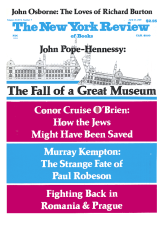In response to:
Jews and Geniuses from the February 16, 1989 issue
To the Editors:
While hanging his head in shame for the moral failures of his patron Igor Stravinsky, Robert Craft lifts it long enough to launch a second attack on John Rockwell [NYR, February 16]. (The first was some years ago, when he reviewed Rockwell’s book All American Music for NYR.) As the present sally edges into vituperation (“Rockwell belongs on a Wheaties box”), nearly every point Craft makes is false.
For example, he cites Rockwell’s mention of “evidence indicating Fascist, or at least authoritarian, tendencies of Stravinsky, Schoenberg and Webern.” But, says Craft, “to associate Schoenberg with Fascism is plainly preposterous.” It is Craft who is preposterous. The statement obviously suggests that the three composers fall into one or the other category. In a later sentence Rockwell makes quite clear that it is Stravinsky who is the pro-Fascist, Schoenberg the authoritarian.
And Stravinsky’s association with Fascism (yes, with a capital F) is unambiguous: “I don’t believe that anyone venerates Mussolini more than I do,” he wrote in a 1930 letter. Perhaps Craft is perturbed by Rockwell’s notice that Craft omitted this letter from his collection of the master’s correspondence.
Even more serious, Craft cites Rockwell for moral confusion. The Times critic had written that “those for whom political and moral correctness is inseparable from art…and have heretofore loved Stravinsky’s music but were unaware of his beliefs, may have a problem.” Nonsense, cries Craft; “as if great artists have not been delinquent in both [political and moral correctness] and great art has not flourished in undemocratic societies.”
So there is no problem? Because Shakespeare was not a democrat, we may not raise questions about the connection between a twentieth century creator’s politics and his art? But precisely this question has agitated critics for decades. Rockwell’s handling of it is far more careful than Craft will allow. The sentence immediately following the one cited reads: “But the real lesson here is that human lives and values are more complex than any ready equation of art and politics and morality.” As the conclusion to a brief column, this strikes me as reasonable, even admirable.
Craft’s bile boils over finally into ignorant pettiness, as he carps about Rockwell’s grammar. Quoting the words “political and moral correctness is,” Craft adds a sneering “sic.” But Rockwell’s usage is perfectly sound. Two adjectives may modify a singular noun without transforming it into a plural. I might write of “the erudite and snide Robert Craft” without referring to two different Crafts, however much I might wish they were.
Finally, a word of advocacy for Rockwell. Not so long ago, the music pages of The New York Times were a middlebrow miasma. John Rockwell is one of the critics who have led The Times away from this. He deserves a salute, not an attack. Speaking of Wheaties, Craft might get its motto straight: “Breakfast of Champions,” not “Breakfast on Champions.” Craft’s dyspepsia is showing.
Niel Glixon
Tucson, Arizona
Robert Craft replies:
How, one wonders, is “middlebrow miasma” distinguished from highbrow and other kinds, and how and in which directions has Rockwell led the Times away from it? And since newspaper “attacks” upset Glixon, why is he trying to provoke a donnybrook in Henahan land?
Glixon charges me with “attacking” Rockwell twice, first in a book review that, as Glixon does not say, exposed the superficiality of Rockwell’s understanding of modern music; I might add that no part of this review was ever refuted. Glixon’s portrayal of the all-powerful Timesman as picked-upon pariah and the challenging reviewer as bully is patently absurd. Attack number two was “launched” not by me but by Rockwell (Times, September 9, 1988) with the insinuation that my edition of Stravinsky’s correspondence deliberately omitted a 1930 letter in which the composer praises Mussolini. I did not respond to this but to Rockwell’s distortion: the document in question is not a letter but an interview. So far from “covering up” for Stravinsky’s Mussolini connection, I have long since published materials far more damaging.
Pace Glixon, Rockwell’s statement about the three composers does not suggest that they “fall into one or the other” of two classifications, whereas my statement clearly allows that the two younger composers could and did have Fascist sympathies that, as a Jew and a Zionist, the older one could not have had. (It seems to me that a great artist is authoritarian by definition.)
Moreover, nothing in my article justifies Glixon’s formulation of an attitude, the opposite of mine, that “because Shakespeare was not a democrat”—is this true in every sense of the word?—“we may not raise questions about the connection between a twentieth century creator’s politics and his art?” As one of the questioners, I suppose I am prepared even for the revisionism by which Oedipus Rex, Apollo, the Psalm Symphony, Perséphone and the other creations of Stravinsky’s “Mussolini” period—hitherto known as his “classic humanist” period—will be recharacterized as Fascist.
By stopping short of quoting Rockwell’s “human lives and values are more complex than any ready equation of art and politics and morality,” I was kinder to him than Glixon, who finds this platitudinous discovery “admirable.” But then, Glixon fails to see that my vision of Rockwell on a Wheaties box could only mean as a photo pinup.
This Issue
April 27, 1989



